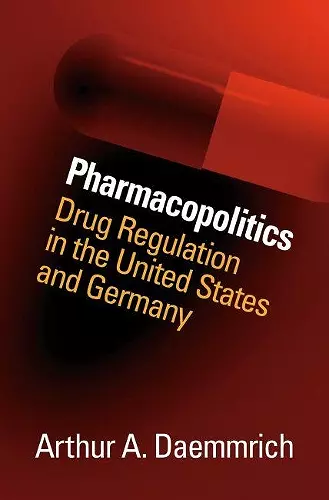Pharmacopolitics
Drug Regulation in the United States and Germany
Format:Paperback
Publisher:The University of North Carolina Press
Published:23rd Sep '11
Should be back in stock very soon

Advocates of rapid access to medicines and critics fearful of inadequate testing both argue that globalization will supersede national medical practices and result in the easy transfer of pharmaceuticals around the world. In Pharmacopolitics, Arthur Daemmrich challenges their assumptions by comparing drug laws, clinical trials, and systems for monitoring adverse reactions in the United States and Germany, two countries with similarly advanced systems for medical research, testing, and patient care. Daemmrich proposes that divergent ""therapeutic cultures""--the interrelationships among governments, patients, the medical profession, and the pharmaceutical industry--underlie national differences and explain variations in pharmaceutical markets and medical care.
Daemmrich carries the United States-Germany comparison from 1950 to the present through case studies of Terramycin (an antibiotic), thalidomide (a sedative), propranolol (a heart medication), interleukin-2 (a cancer therapy), and indinavir (an AIDS drug). He points to different political constructions of ""the patient"" in the United States and Germany to clarify important differences in government policies and in the distribution of power among key social actors. Daemmrich advises that international regulatory harmonization and globalization in medicine must retain flexibility for social and political variation between countries, even as they achieve technical standardization.
This clear and persuasive book is the first to provide a detailed cross-national comparison of the politics of pharmaceutical drug regulation. Anyone concerned with understanding how governments, social movements, professional groups, and corporations determine which drugs end up on our pharmacy shelves should read this book carefully.(Steven Epstein, University of California, San Diego, author of Impure Science: AIDS, Activism, and the Politics of Knowledge)|Daemmrich uses a comparative study of pharmaceutical regulation in the U.S. and Germany to show that in order for medical globalization to be successful, it must accommodate persisting social and political variation even when technical standardization has been achieved. He looks at the relationships among governments, doctors, the pharmaceutical industry, and patients in case studies of an antibiotic, a sedative, a heart medication, a cancer therapy, and an AIDS drug.
ISBN: 9780807872413
Dimensions: unknown
Weight: 319g
224 pages
New edition